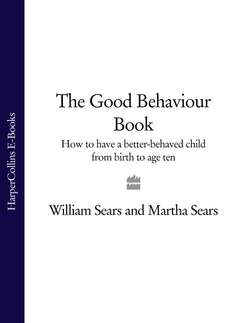Читать книгу The Good Behaviour Book: How to have a better-behaved child from birth to age ten - Martha Sears - Страница 45
talking with toddlers: what they can understand, what they can’t
ОглавлениеEven though toddlers don’t say much, that doesn’t mean that they don’t comprehend what you are asking. As a general guide, take what you imagine your toddler understands and double it. She is probably picking up at least that much.
Follows directions. Around age fifteen months toddlers can begin to follow one-step directions: “Get the ball.” By two years they can follow two-step directions: “Please find your shoes and bring them to me.” Prior to eighteen months toddlers seldom follow verbal warnings unless accompanied by action. Shouting “Don’t pull the cat’s tail” is meaningless unless you get up, cross the room, pry his fingers loose from the cat’s fur, and show the child as you tell him: “Pet the cat. Be gentle to the cat. Don’t pull the cat’s tail.” By two, children can follow most verbal commands without physical help.
A one-year-old baby can understand that “no” or “stop” means that she should stop what she is doing, and that is about the limit of her understanding. But that doesn’t mean that you don’t offer an explanation: “Stop. Don’t touch”, you say as you pull her hands away. “Hurt baby.” As time goes by, make your explanation more complex: “Stop. Don’t touch. Hurt baby. Cooker hot!” Parents can usually tell how much of their explanation sinks in by their child’s reaction. For the toddler, keep explanations simple and brief. Better to spend your creative energy devising alternatives to misbehaviour than defining terms.
A useful developmental fact that parents need to remember is that toddlers think concretely. They cannot generalize concepts. An eighteen-month-old can learn that your cooker is hot (usually by experiencing it solo – the hard way – or by some supervised exploration), but when he goes to Grandmother’s house, don’t rely on his knowing that all cookers are hot. This ability to generalize develops around age four.
Discipline through talking. A toddler’s growing receptive language skills (what she understands) make discipline easier. Between eighteen months and two years, children may say little, but they understand all. (All brief, simple sentences, that is.) Capitalize on this developmental achievement by announcing what you’re going to do before you do it: “Daddy’s going to change your nappy.” Rather than catching your toddler by surprise, a prior announcement at least gives daddy a fair chance of getting the child’s cooperation. (See related feature, “Discipline Talk”.)
Baby’s expressive language skills (what she says) also make discipline easier. Not only can she now understand what you want her to do, she can tell you what she wants: “Off” means she wants her nappy off. Here’s when your wise investment in responding to your baby’s cues begins to pay off. A baby who trusts that her signals will be responded to learns to give more readable signals.
Between eighteen and twenty-four months of age another developmental perk makes discipline easier, the ability to think before acting. How consistently a toddler does this depends more on temperament than intelligence. Impulsive children often rush into a feat instead of first figuring out the consequences and plotting an alternative course. Just watching your child play will teach you where he is in his developmental thought processes. At fifteen months Lauren used to drive us bananas by trying to go up a flight of steps carrying a bowl of cereal. To prevent the inevitable spills, we didn’t allow this activity. At nineteen months Lauren grabbed a bowl of cereal and started for the steps. She stood at the bottom, looked up turned around, and handed the bowl of cereal to Martha before taking off up the steps. Reaching the top, she turned around and reached out for Martha to bring the bowl of cereal up to her. She now had matured enough to figure out the consequences of her action and develop creative alternatives using her adult resources for help. These improvements in language and cognitive skills also decrease the likelihood of tantrums, since the child is less frustrated and better able to figure out alternative ways to get what she wants.
